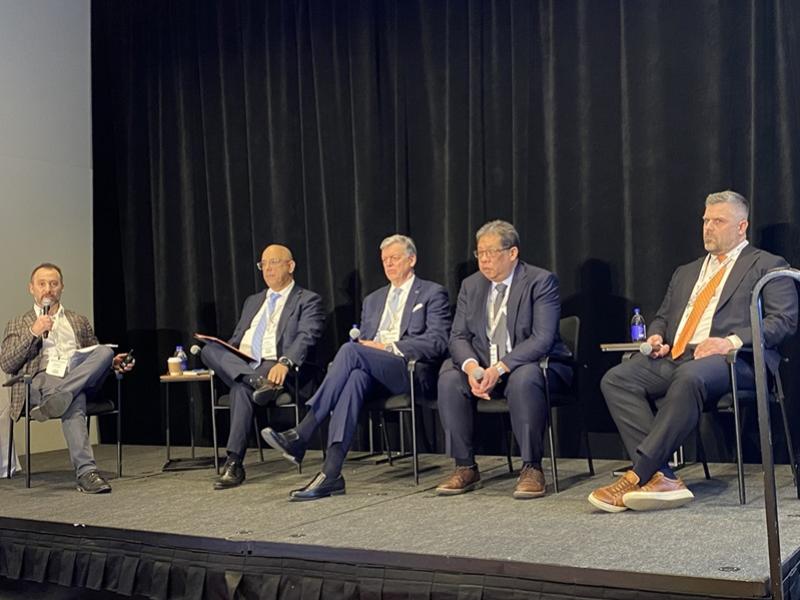
Fears of an imminent recession in Canada might be a bit overblown – at least according to one senior Bank of Canada economist who spoke at Thursday’s Ottawa Real Estate Forum.
Mario Lefebvre, the BoC’s regional director (economics), didn’t rule out the possibility of a recession during the next year or so when he spoke to a record crowd of over 710 commercial real estate professionals at the annual Informa conference.
However, he did say at this point there are numerous reasons to believe the economy could weather the current slowdown without actually slipping into negative growth.
“Slower growth, but there is no catastrophe in sight,” was his message in one of the day’s keynote presentations at the Ottawa Conference and Event Centre.
“Right now we have no clear sign that the famous recession is looming and when we look at the hard evidence we can’t quite find it – yet,” he said. “It is somewhat ironic that there are people who think we already are in a recession – with a five per cent unemployment rate and wages increasing by about five per cent a year.”
He then dove into an analysis of current labour markets (very tight, with “Help Wanted” signs in many windows), a continuing high level of business investment in their people and operations to boost productivity, the country’s efforts to make up for immigration lost during the height of the pandemic and global factors including a war and supply chain bottlenecks which, in some respects, may be starting to ease.
Canada's economy slowing down
Woven through the discussion was the impact the Bank of Canada’s rapid three per cent rise in interest rates is having. According to Lefebvre, so far those rate increases are doing exactly what was intended.
“Is the economy slowing? For sure it is. It had to,” he explained, putting a strong emphasis on the words “had to”.
“We are going to keep on trying to bring about what we call a soft landing In the economy, but this is a tough one to do, trying to increase interest rates just enough that we don’t choke the economy off; at the same time try to have inflation coming back down to our target because this is the best service that we can provide to the Canadian economy.”
That target is the two per cent range, and Lefebvre said Canadians must have confidence that will happen soon.
One of the BoC's biggest fears, he said, is that long-term wage settlements in the five, six or seven per cent range would continue upward pressure on the prices of goods and services, and this would continue to drive higher inflation.
“There used to be a time not so long ago when people would say, 'Oh yeah inflation is going to be high, but only for a year or two’. Now they are saying it is going to be high for up to four or five years.
“That’s when we (the Bank of Canada) start going, okay, what we don’t want here is the entire economy thinking that inflation is going to be higher for longer.”
Wages a key driver for inflation
He said one encouraging sign is that recent contracts containing larger wage increases have tended to be shorter-term arrangements which reflect what has happened so far.
In a longer-term contract, “if everybody gets a wage increase of five per cent (annually), you are not going to get two per cent inflation. It’s mathematics. It’s not going to happen.”
He said the BoC’s interest-rate hikes will impact some sectors of the economy, but he believes with today’s labour shortage, most people who could be impacted would be able to find a new job.
“Chances are there are people who are going to be affected over the short term by rising interest rates and a slowdown in some sectors, but chances are they can find a job elsewhere because there are a lot of vacancies in the labour market.”
One of the first impacts of the rates has been a slowdown in the housing market. While higher interest rates have slowed or reversed dramatic price increases seen over the past few years, they also make financing such a significant purchase a bigger challenge.
Youth and interest rates
Many people entering the housing market now are also younger – so today’s interest rates are a phenomenon they’ve never experienced. He said his own younger relatives are “going completely berserk over the fact that mortgage rates are now about five per cent.
“When you talk about this to an elderly (person) like me, you kind of go 'Five? Hah. We’ve seen 15, we’ve seen 20, what’s wrong with five?' And by historical standards five is not out of whack at all, but for youth it is because they’ve never seen that.”
Lefebvre admitted the speed and depth of the slowdown might have caught some by surprise.
“That is where we may have a bit more impact from our already increasing interest rates that we originally thought.”
The bottom line, however, is that the BoC needs to manage the entire economy, not just a few sectors. Lefebvre said if needed, those rates will go higher, but he noted “I don’t know what’s going to happen.”
Neither did he offer any insights into the bank’s upcoming fall and winter interest rate announcements.
“I cannot tell you how far we are going to go because we have to monitor how the economy reacts to what we have already done.”









